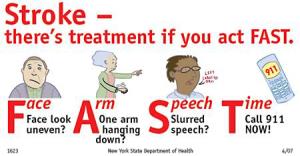My sister-in-law witnessed my father-in-law, Bill, having a mini-stroke (TIA) this week. What a heartbreaking story. She was sitting with him in the living room and noticed his face droop on one side. Then his speech became garbled. It was over in two minutes and he could talk fine again. He had no idea it happened.
She was understandable traumatized and wanted to talk about it. My husband and I are 1000 miles away and applaud her efforts to care for my father-in-law in her own home till he passes. We both think she is a saint.
Through my Internet research it says a TIA is a mini-stroke. TIA’s can be warnings that a bigger stroke can be coming. In my mom’s case, she has had so many TIA’s that she has been diagnosed with vascular dementia. I have never personally witnessed a TIA with my mom.
I guess you could say we were lucky it was only a TIA with Bill. Unfortunately, my father-in-law is now on hospice. Hospice is comfort care, so the goal is no hospitals or ambulances if at all possible.
Every caregiver, family member and senior living professional should know the signs of a stroke and what to do. Stokes can cause permanent damage. If you get someone to a hospital in time, it can reverse the affects of the stroke. Go to www.strokeassociation.org to learn more. They say you should act FAST! FAST stands for: face drooping, arm weakness, speech difficulty and time to call 911.
Have any of you encountered or witnessed a TIA or stroke?
Diane Twohy Masson’s new guide book for seniors, “Your Senior Housing Options,” is available on Amazon.com with a 5-star rating. It reveals a proactive approach to navigating the complex maze of senior housing options. It will help you understand the costs and consequences of planning ahead or waiting too long. Learn firsthand tips from someone who is currently advocating for three aging parents.
Among the thousands of seniors she and her teams have assisted in finding the right senior living community, the most difficult case has been helping her own parent. Masson spent two years exploring senior housing options with her mother before finding the ideal Continuing Care Retirement Community for her. After eight years in this independent living setting, she helped her mother transition into an assisted living community. Seven years later, even as a senior housing expert, Masson struggled with the decision to move her mother into a skilled nursing community.
More related articles by Diane can be found at Tips2Seniors.com or like Tips 2 Seniors on Facebook.
Diane Twohy Masson has worked in senior housing since 1999. She is an award-winning certified aging services professional and the author of Senior Housing Marketing: How to Increase Your Occupancy and Stay Full for senior living professionals.



